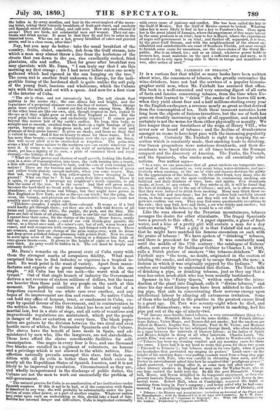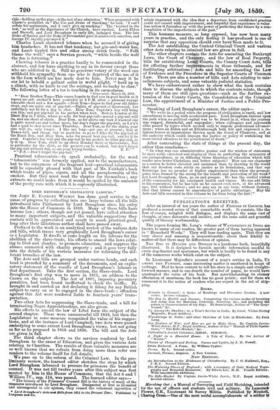MR. FAIRHOLT ON TOBACCO. • Jr is a curious fact that
whilst so many books have been written about wine, the consumers of tobacco, who greatly outnumber the wine-drinkers, have not had the services of a popular histoiio- grapher until now, when Mr. Fairholt has assumed that office. His book is a well-executed and very amusing digest of all sorts of facts and fancies concerning tobacco, from the time when Eu- ropeans first learned to " drink " the smoke of its leaves till now, when they yield about four and a half millions sterling every year to the English exchequer, a revenue nearly as great as that derived from the consumption of tea. Both these innocent narcotics have long been the objects of furious invectives, but the use of both has gone on steadily increasing in spite of all opposition, and mankind certainly is not the worse for them either physically or morally. We live longer than our forefathers of the reign of Henry VIII., who never saw or heard of tobacco ; and the decline of drunkenness amongst us seems to have kept pace with the increasing popularity of tobacco. Certainly Mr. Fairholt is right in denying the as- sertion which is constantly made, that smoking leads to drinking. Our Saxon progenitors were notorious drunkards, and their de- scendants were hard drinkers at all times between the Norman conquest and the discovery of America. The Turks, the French, and the Spaniards, who smoke much, are all essentially sober nations. Our author says— "As a rule, we can pronounce that all great smokers are temperate men, and most of them extremely so, very many being water-drinkers, and par- 1 ticularly when smoking, as the use of wine and liquors destroys the palate for the appreciation of fine tobaccos. On the other hand, very many who do - not smoke, and who are the most vociferous in condemning smoking, are habitual and daily drinkers of wine, beer, and spirits. Few drunkards smoke, at least, to any extent. If they smoke at all, it will be found that the love of drinking led to the use of tobacco ; and not, as is often asserted, that they were induced to drink from smoking. Many may think these re- marks too bold and trenchant ; but let our readers look carefully around them, in their respective circles, and they will not fail to find their ex- perience confirm our own. They may find some questionable exceptions to the rule • they may find here and there, a sot who drinks and smokes ; but take away from him his tobacco, he would be a sot still."
Like the coca chewed by the Peruvian mountaineers, tobacco assuages the desire for other stimulants. The frugal Spaniards have a proverb to this effect, "A paper cigarette, a glass of fresh
water, and a kiss of a pretty. girl sustain a man for a day without eating." What a pity it is that Falstaff did not smoke that he might have matched his famous encomium on sack witi the praise of tobacco ! We have spoken of " drinking " tobacco Sand there is precedent for the phrase. It was constantly used until the middle of the 17th century : the catalogue of Rubens' effects, sent over by Sir Balthazar Gerbier to Charles I. in 1640, calls a Dutch picture of smokers "the tobacco-drinkers." Mr. Fairholt says "the term, no doubt, originated in the custom of inhaling the smoke, and allowing it to escape through the nose ; a fashion in which it was originally enjoyed by the Indians." we confess our inability to understand this dictum. The Turks talk of drinking a pipe, or drinking tobacco, just as they say that a man has eaten much stick who has been soundly bastinadoed.
Spenser in his "Fairy Queen," written soon after the intro- duction of the plant into England, calls it "divine tobacco," and. since his day most literary men have been addicted to the sooth- ing pipe, that aids in concentrating their nervous energy upon intellectual labour by allaying all extraneous irritation. Some of them who indulged in the practice to the greatest excess lived to a great age. Dr. Parr was seventy-eight when he died, and Hobbs of Malmesbury, who was very potent in smoking, had his pipe put out at the age of ninety-two.
Of literary men Goethe hated tobacco, a very extraordinary thing for a German to do. Heinrich Heine had the same dislike. Of French littera- teurs Balzac, Victor Hugo, and Dumas did not smoke ; but the smokers are Alfred de Musset, Eugene Sue, Merimee, Paul de St. Victor, and Madame Dudevant, better known by her sobriquet George Sand, who often indulges in a cigar between the intervals of literary labour as the ladies of Spain and Mexico delight in doing at 'all other intervals. Charles Lamb, 'the gentle Ella,' was once a great smoker. In a letter to Wordsworth he says —` Tobacco has been my evening comfort and my morning curse for these five years. I have had it in my head to write this poem for these two years (' Farewell to Tobacco ') ; but tobacco stood in its own light, when it gave Inc headaches that prevented my singing its praises.' Lamb once—in the height of his smoking days—was puffing coarsest weed from a long clay pipe in company with Parr, who was careful in obtaining finer sorts, and the Doctor in astonishment asked him how he acquired this prodigious power !' Lamb answered, by toiling after it, as some men toil after virtue.' Of other literary smokers in England we may note Sir Walter Scott, who at one time carried the habit very far. So did the poet Bloomfield. Camp- bell, Moore, and Byron delighted in its temperate enjoyment, as does our. present laureate Tennyson, who has echoed its praises with Byron in im- mortal verse. Robert Hall, when at Cambridge, acquired the habit of smoking from being in Parr's company ; and being asked why he had com- menced, 'I am qualifying myself for the society eta Doctor of Divinity, and • Ibbeeee : its History and Associations : including an Account of the Plant and its Manufacture ; with its Modes of Use in all Ages and Countries. By 5. W. Fair- holt, F.S.A., Author of "Costume in England," Sic. With 100 Illustrations by the Author. Published by Chapman and Hall. thrs—holding up the pipe—is the test of my admission.' When presented with Clarke's pamphlet on The Use and Abuse of Smoking,' he said, I can't refute his arguments, and I can't give up smoking.' The 'learned in the law,' SS well as the dignitaries of the Church, have smoked. Lords Eldon and Stowell, and Lord Brougham in early life, indulged thus. The late Duke of Sussex and the Duke of Devonshire gave it aristocratic sanction, and George IV. royally patronised it."
Charles Lamb slandered tobacco when he accused it of giving him headaches. It has not that tendency, but gin-and-water has, and Lamb tippled this and other strong drink freely. "Folk blame the wolf," says a Servian proverb, "while beside the wolf the fox is fattening."
Chewing tobacco is a practice hardly to be commended in the abstract, and few have anything to say in its favour except those who are addicted to it. Still no generous votary of the weed can withhold his sympathy from one who is deprived of the use of it in the form which use has made dear to him. Never may it be our lot to behold a gallant sailor in woful plight, "hard up in a clinch, with no knife to cut the seising!, and no backy to cher." The following letter of a tar is touching in its earnestness.
" Gravesend, March 24, 1813.
"'Dear Brother Tom—This comes hopein to find you in good health as it leaves me safe anckor'd here yesterday at 4 P.M. arter a pleasant voyage tolerable short and a few squalls —Dear Tom—hopes to find poor old father stout, and am quite out of pig-tail.—Sights of pig-tail at Gravesend, but unfortinly not fit for a dog to cher. Dear Tom, Captain's boy will bring you this, and put pig-tail in his pocket when bort. Best in London at the Black Boy in 7 dike, where go asks for best pig-tail—pound a pig-tail will do, and am short of shirts. Dear Tom, as for shirts ony took 2 whereof one is quite wored out and tuther most, but don't forget the pig-tail, as I a'n't had a quid to char never since Thuisday. Dear Tom, as for the shirts, your size will do, only longer. I liks um long—get one at present ; best at Tower-hill, and cheap, but be particler to go to 7 diles for the pig-tail at the Black Boy, and Dear Toni, acks for pound best pig-tail, and let it be good. Captain's boy will put the pig-tail m his pocket, he likes pig-tail, so ty it up. Dear Tom, shall be up about Monday there or thereabouts, Not so perticuler for the shirt, as the present can be washed, but don't forget
the pig-tail without fail, so am your loving brother. T. P.'" " P.8.—Don't forget the pig-tail.' "
Practical tobacconists—to speak archaically, for the word " tobacconists " was formerly- applied, not to the manufacturers, but to the consumers of the fragrant leaf—practical tobacconists will be especially pleased with that part of Mr. Fairholt's book which treats of pipes, cigars, and all the paraphernalia of the smoker. But they must read the chapter for themselves ; any extracts we could make from it would be spoiled by the omission of the pretty cuts with which it is copiously illustrated.



























 Previous page
Previous page